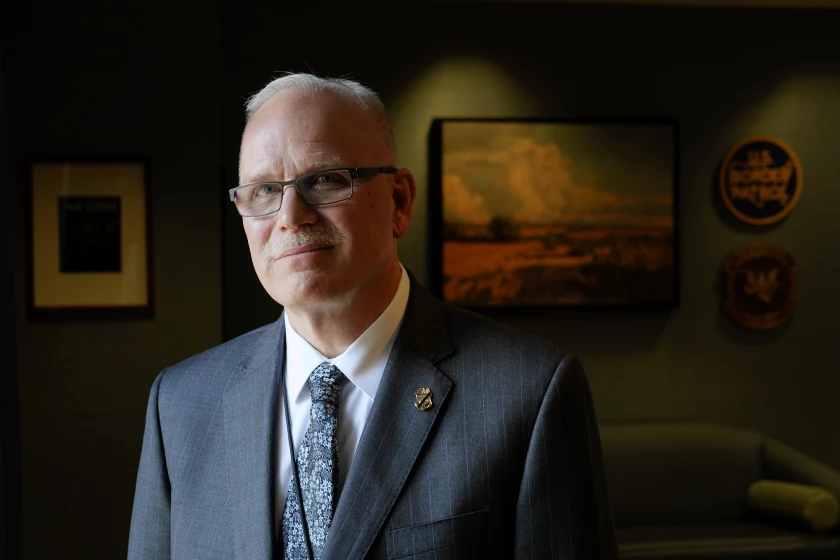The frazzled U.S. Border Patrol is getting more attention from the Joe Biden administration after tense meetings between officials and frontline workers as the agency grapples with one of the biggest immigration spikes in decades on the Mexican border.
The Secretary of the Department of Homeland Security, Alejandro Mayorkas, who oversees the Border Patrol, has presented a list of 19 ways to improve working conditions after encountering cold receptions from agents, said Chris Magnus, the new commissioner of the Customs Office. and United States Border Protection (CBP).
Mayorkas also released a document promising increased prosecutions against people accused of assaulting CBP personnel on the job, an issue raised at a recent meeting in Laredo, Texas, and elsewhere, Magnus said Tuesday.
“It’s something the officers on the ground want to hear, because assaults are going up,” Magnus told The Associated Press. “We don’t just see people fleeing to the United States to escape situations. We see smugglers, cartel members and drug organizations actively engaged in harm.”
Efforts to address working conditions for agents coincide with criticism of Biden from across the political spectrum over immigration. The president has tried to repeal many tough measures from his predecessor, but he has been pressured by the situation at the border, which could make things difficult for Democrats in the midterm elections.
Last year, CBP identified migrants from around the world in some 1.7 million encounters at the US-Mexico border. The total number, one of the highest in decades, is inflated by the repeated detentions of people who were returned without the opportunity to request asylum, within a public health order issued at the beginning of the pandemic.
Immigration advocates have criticized the administration for not repealing that order, known as Title 42, while critics, including many border agents, say Biden’s policy of allowing children and families to stay in the country and petition asylum has encouraged irregular immigration.
Magnus said agents and the government are simply trying to manage a difficult situation.
“We see people encountering political conditions and violence, unsafe conditions to live and work, at unprecedented levels,” the former Tucson, Arizona, police chief said in an interview, his first since taking office on Friday. “We have seen, for example, earthquakes or other environmental phenomena. We have seen unprecedented levels of poverty. In many respects, all of these things are pushing back a high number of migrants to this country.”
The administration has tried to address the causes of migration, for example by increasing aid to Central America and resuming a visa program canceled under former President Donald Trump. He has asked other countries, like Mexico, for help to do more to detain or receive immigrants.
The number of arrivals has risen and the government has decided to allow more families to stay and apply for asylum, in a process that can take years. That has frustrated some border agents who spend their shifts processing and moving people, rather than working in the field.
That frustration was laid bare last month in Laredo, when several agents met with Mayorkas and Border Patrol Chief Raul Ortiz, who admitted that morale was at an “all-time low,” according to video leaked by the Washington Examiner. One agent complained that he “didn’t do anything” except release people into the United States, referring to the practice of allowing migrants to wait at liberty while their cases play out in immigration court.
In another meeting in Yuma, Arizona, Mayorkas told agents that he understood that detaining families and children “is not what they signed up for” and that their jobs were becoming more complex in the face of a spike in arrivals of Cubans, Nicaraguans and Venezuelans. , according to a video shared by the conservative website Townhall. One of the agents turned his back on the secretary.
Magnus has heard similar complaints at meetings. “I think it’s been difficult for a lot of them, who spent most of their careers, or expected their careers to be largely working in the field, on the border.”
The commissioner declined to specify the 19 aspects in which Mayorkas “wants to see improvements” because they have not been made public. But another official, speaking on condition of anonymity to comment on an internal document, said they included expanding the duties of a new category of civilian employee and adding duties such as transporting migrants to medical centers so officers can return to their other duties.
Another point calls for faster decisions on asylum cases at the border. Agents have expressed frustration that asylum seekers find themselves released into the United States, often for years, as their claims move through a system overwhelmed by some 1.6 million backlogs.
Magnus said he hoped to expand mental health services for agents and offer them more resources to help them and their families deal with a stressful job that requires frequent relocation.
“There is never an easy solution to boost morale in any organization, but I certainly see the very difficult conditions that the men and women of Border Patrol and CBP in general have been working under,” he said.

